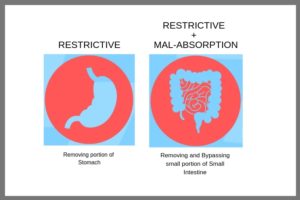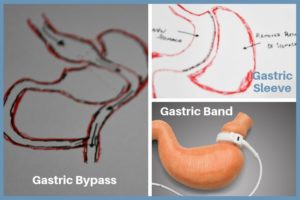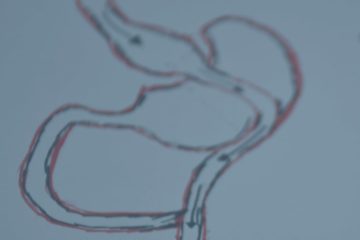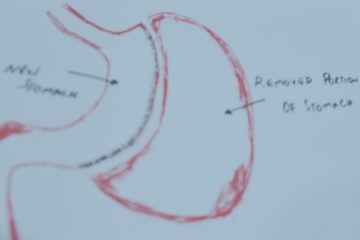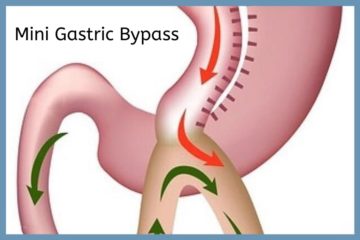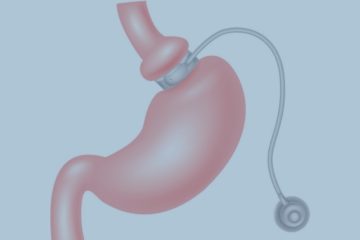What is Bariatric Surgery?
Dr Maran who does Bariatric surgery in Chennai happens to be one of the top bariatric surgeon in Chennai. He explains that “Baros” in Greek means “weight” and “Iatr”, also in Greek means “treatment”. So as the name goes, bariatric literally means “Treatment for weight” or “Treatment for obesity”. Bariatric surgery is a treatment for people who are severe or very severely obese and are suffering from one or more comorbid conditions.
The human body best responds to a proper diet and workout regimens. But morbidly obese people have constraints and can neither maintain a diet nor have ease in performing workouts. In other words, when people become extremely obese (BMI above 40) and also develop co-morbid conditions, it is not possible to manage their weight. Change in lifestyle and dieting is no more enough for them to sustain weight loss. Physical activities are almost impossible. The only scientifically available option before such an individual is bariatric surgery also called weight-loss surgery. This surgical approach gives more hope for the severely and very severely obese individuals.
More About Bariatric Surgery
There are basically two principles in the field of bariatric or weight loss surgery. They are restriction and malabsorption.
The Principle of Restriction
Restrictive basically means physically restricting the size of the stomach. So restriction is making the stomach smaller. This results in the stomach holding less volume of food. Also, reducing the stomach surface area slows down the digestion process. Gastric Banding and Gastric Balloon are restrictive bariatric surgery procedures.
The Principle of Restriction and Malabsorption
This involves restriction principles and with it malabsorption too. The surgical removal of some parts of the digestive tract causes, the body loses the capacity to absorb the nutrients. This is called malabsorption. Gastric Bypass Roux-en-Y, Mini Bypass, Duodenal Switch, and Biliopancreatic Bypass are surgical procedures that employ both the principles of restriction and malabsorption.
Can all overweight and obese people undergo Bariatric Surgery?
Not really. For a person to undergo bariatric surgery, the bariatric surgeon would evaluate if it is absolutely necessary. Here are three important criteria a bariatric surgeon would consider before recommending an individual to undergo bariatric surgery.
- Whether the person has a BMI (Body Mass Index) of 40 or more. In other words, if the patients are very severely obese or morbidly obese.
- Have a lesser BMI of 35 or even slightly lesser (these still should fall under the category of moderately obese or severely obese) but have other medical conditions associated with obesity called co-morbid conditions.
- Whether the person has tried all other weight loss methods which were unsuccessful and is now prepared to undergo the surgery. With fully knowing what the procedure is and its potential risks
If you're an individual who fits in any of the above categories and you are meeting with the bariatric surgeon you can, in turn, ask him a few questions to get more clarity. Click here to know the ten questions you can ask your bariatric surgeon before weight loss surgery.
The above criteria may now induce an inquisition to know more about BMI and co-morbid medical conditions. Let us see them briefly here.
What is BMI or Body Mass Index?
BMI stands for Body Mass Index. BMI is generally a measure of body fats in adults. Bodyweight in kg divided by the square of height in meters gives BMI.
BMI = kg/(m)2
If BMI is greater than 25 and within 30, the person is overweight. We identify a person as moderately obese if the BMI is between 30 and 35. If the BMI is greater than 35 and within 40, the person is severely obese and if the BMI is beyond 40, then the person is very severely obese or morbidly obese. If you want to know more about BMI and calculate your BMI, click here
What are co-morbid medical conditions?
Co-morbid medical conditions or co-morbidity is basically a very general term. Co-morbid medical conditions or co-morbidity refers to the additional diseases or disorders that accompany a primary disease.
The greatest co-morbid risk is the risk of acquiring type-2 diabetes. The other co-morbid conditions are High blood pressure, sleeping disorders like sleep apnea, stroke, fertility-related problems, osteoarthritis, etc. It should be kept in mind that these health issues affecting the morbidly obese persons need not necessarily happen only if an individual crosses a BMI of 40. It may happen to people who have crossed a BMI of 30 or 35 also. This is quite complex and it might involve genes, lifestyle associated stress, etc. The health issues affecting morbidly obese patients' people are myriad.
Read more about co-morbidity and it's ill-effect here.
How does weight reduction happen in any Bariatric Surgeries?
Weight reduction occurs in two ways. One way restricts the quantity of food taken. Whereas, the other way makes use of restrictive and mal-absorptive methods. Mal-absorption is allowing the body to absorb less.
Generally, doctors recommend restrictive bariatric procedures for people who overeat and recommend the combination of bariatric procedures for people who have severe or morbid obesity due to the combination of diseases and other factors.
The different types of bariatric surgeries and how weight reduction happens
The various commonly done bariatric procedures are the following below. Below are each of the weight loss surgery types and their principles of achieving weight loss.
- Intra Gastric Balloon – Restrictive
- Gastric Banding – Restrictive
- Sleeve Gastrectomy also called Gastric Sleeve – Restrictive
- Gastric ByPass also called Roux-en-Y Gastric Bypass – Both Restrictive and Mal-Absorption
- Mini Gastric ByPass also called Roux-en-Y Gastric Bypass – Both Restrictive and Mal-Absorption
- Metabolic Surgery – Both Restrictive and Mal-Absorption
- BPD (Bilio Pancreatic Diversion) and BPD/DS (Bilio Pancreatic Diversion with Duodenal Switch) – Both Restrictive and Mal-Absorption
Bariatric Surgery using Advanced Laparoscopy
Dr Maran, the leading bariatric surgeon in India employs advanced laparoscopic techniques while performing bariatric surgeries. He has well experience in performing different types of bariatric surgeries. The bariatric surgery types Dr Maran performs are
Gastric Banding
Intra Gastric Balloon
Sleeve Gastrectomy or Gastric Sleeve
Gastric Bypass Roux-en-Y or simply Gastric Bypass
Mini Gastric Bypass
Duodenal Switch or Metabolic Surgery
Diet Before Undergoing a Bariatric Surgery
A bariatric surgeon normally recommends a pre-surgical diet regimen if you decide to undergo the surgery. In other surgeries, most surgeons advise to eat lean or skip your meal a few hours before the surgery. Well, it is a different story when it comes to any form of bariatric surgery.
Why pre-surgical or pre-op diet for Bariatric Surgery?
- Since the entire talk and action is about reducing the food intake, a pre-surgical diet becomes essential. This gives a signal to the body that things are going to come in a reduced quantity. This approach immensely reduces the risks after the bariatric surgery.
- Not only that, the pre-surgical diet or the pre-op diet makes laparoscopic bariatric surgery more effective. This pre-op diet makes the flogging liver firmer. It also makes the slippery fat found in the visceral region to shrink. These two prevent unnecessary bleeding during the surgery and hence the effectiveness of the surgery.
- The diet helps bring the co-morbid condition under control before the surgery.
- All these above factors contributed to reducing the recovery time after the surgery.
The primary aim of the pre-op diet is to reduce weight and to give proper hydration to the body. This helps in making the liver firmer and reducing the visceral fat.
When to start Pre-Op Diet for bariatric surgery?
The patient should undergo a pre-op diet at least 2 weeks before the actual bariatric surgery date. This is recommended by the bariatric surgeon. So it is like prepping your body for the surgery.
The Actual Pre-Op Diet for Bariatric Surgery
- Water – Helps to maintain the fluid content of the body.
- Diluted juices of fruits and vegetables – this provides you with essential minerals, salts, and vitamins, and also energy.
- Soups – Soups made of mashed chicken can provide essential fat to the body in addition to necessary protein.
- Protein Shake – Your bariatric surgeon recommends the best protein shake. Protein shakes are necessary to supply the body with the essential protein needs. This is required for weight loss.
- Milk – Milk not only gives protein but also supplies the essential fat to the body.
- Calcium and Multivitamin Tablets – Your bariatric surgeon recommends the necessary calcium and vitamin supplements. He recommends based on the requirement of your body.
Click here to know the general pattern of diet you need to follow after any weight loss surgery.
Diet after Bariatric Surgery
Undergoing bariatric surgery does not give a passport to eat anything and everything. So what should a person who has undergone bariatric surgery eat as a continuing practice and how should they eat?
Positive Outcomes of Bariatric Surgery
The stomach capacity and its churning action reduce after bariatric surgery. In Gastric bypass bariatric surgery, the digestion happens in the small intestine and not in the stomach which is a radical alteration in the digestive process. The surgeries that involve malabsorption, requires a marked increase of micronutrients. These are the general reasons why diet plays a vital role after your bariatric surgery.
Diet Immediately after Bariatric Surgery
The bariatric surgeon together with the nutritionist would typically take you through the diet. Post-surgery, the patient must adhere to the prescribed diet immediately and strictly. The diet will comprise lighter soup, fruit juices, protein shakes, mashed vegetables, milk. In addition to that, you have to take calcium and vitamin tablets for life.
Diet to be followed regularly over the course – What to eat?
Your diet after your recovery from bariatric surgery or long-term bariatric diet would, for the most part, consist of a simple goal. The diet goal would be to eat healthily, increase protein intake, drink more water and fluids. So anything like milk, soup, vegetables, fruits, lean meat, all in smaller proportions can be consumed along with the very essential bariatric vitamins.
Apart from what to eat after bariatric surgery, Dr Maran who has done many Bariatric Surgery in Chennai also talks about "How to eat after a Bariatric Surgery".
Non-cosmetic Nature of Bariatric Surgery
Unlike liposuction, Bariatric surgery is not a cosmetic surgery procedure. It is more therapeutic because it gives relief from co-morbid conditions. Bariatric surgery does not involve any sucking out of lipocytes or fat cells. Bariatric surgery and Liposuction surgical procedures are completely different from each other and should not be confused between each other.
Types of Bariatric Surgery in Chennai done by Dr Maran, the top Bariatric Surgeon in Chennai
Springfield Wellness Centre is a well known clinic offering Bariatric surgery in Chennai. The centre under the aegis of Dr Maran treats severely obese and very severely obese with bariatric surgery. Dr Maran, a leading bariatric surgeon in Chennai treats the two classes of obese patients using advanced laparoscopic bariatric procedures.
Gastric Bypass with Roux-en-Y
In Gastric Bypass Roux En Y type of Bariatric Surgery for weight loss, the stomach is reduced to its size and a bypass is created from the reduced stomach to the small intestine. The...
Read MoreSleeve Gastrectomy
Sleeve Gastrectomy or Gastric Sleeve is a process involving the removal of a portion of the stomach. Along the curvature, the stomach is cut. The excised stomach is removed. It has...
Read MoreMini Gastric Bypass
Mini Gastric Bypass surgery is one of the minimally invasive surgical weight loss procedures available today. The Mini gastric bypass is similar to the time-tested gastric bypass with...
Read MoreMetabolic Surgery
People with normal weight but have severe co-morbid conditions like diabetes, hypertension, etc, are recommended for surgery for Type-2 Diabetes. This surgery is termed Metabolic Surgery.
Read MoreGastric Balloon
Gastric balloon or intragastric balloon is a medical procedure that involves placing a specialized balloon made of inert materials inside the stomach. The presence of the balloon in...
Read MoreGastric Banding
Laparoscopic Gastric Banding, also termed Laparoscopic Adjustable Gastric Banding is commonly called Lap-band. The lap band is made of inflatable silicone and is biocompatible. A laparoscopic...
Read MoreOur Popular Blogs on Bariatric Surgery
Here are a few popular blog topics on Bariatric Surgery on our site written by Dr Maran, one of the best bariatric surgeon in Chennai.
10 Questions to Ask Your Bariatric Surgeon Before Weight Loss Surgery
How to eat after a Bariatric Surgical Procedure
How much weight do you lose after a Bariatric Surgical Procedure?
Lifestyle Changes After Bariatric Procedure
Is Alcohol Consumption a complete no-no after Bariatric Procedure?
Does Bariatric Surgery Affect Fertility?
Is it okay to gain weight after Bariatric Procedure?

